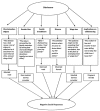HIV serostatus disclosure: Experiences and perceptions of people living with HIV/AIDS and their service providers in Gujarat, India
- PMID: 24250046
- PMCID: PMC3830162
- DOI: 10.4103/0972-6748.119615
HIV serostatus disclosure: Experiences and perceptions of people living with HIV/AIDS and their service providers in Gujarat, India
Abstract
Background: Human immunodeficiency virus (HIV) disclosure offers important benefits to people living with HIV/AIDS. However, fear of discrimination, blame, and disruption of family relationships can make disclosure a difficult decision. Barriers to HIV disclosure are influenced by the particular culture within which the individuals live. Although many studies have assessed such barriers in the U.S., very few studies have explored the factors that facilitate or prevent HIV disclosure in India. Understanding these factors is critical to the refinement, development, and implementation of a counseling intervention to facilitate disclosure.
Materials and methods: To explore these factors, we conducted 30 in-depth interviews in the local language with HIV- positive individuals from the Integrated Counselling and Testing Centre in Gujarat, India, assessing the experiences, perceived barriers, and facilitators to disclosure. To triangulate the findings, we conducted two focus group discussions with HIV medical and non-medical service providers, respectively.
Results: Perceived HIV-associated stigma, fear of discrimination, and fear of family breakdown acted as barriers to HIV disclosure. Most people living with HIV/AIDS came to know of their HIV status due to poor physical health, spousal HIV-positive status, or a positive HIV test during pregnancy. Some wives only learned of their husbands' HIV positive status after their husbands died. The focus group participants confirmed similar findings. Disclosure had serious implications for individuals living with HIV, such as divorce, maltreatment, ostracism, and decisions regarding child bearing.
Interpretation and conclusion: The identified barriers and facilitators in the present study can be used to augment training of HIV service providers working in voluntary counseling and testing centers in India.
Keywords: Disclosure; fear; human immunodeficiency virus; people living with HIV/AIDS; social stigma.
Conflict of interest statement
References
-
- New Delhi: National AIDS Control Organization, Ministry of Health and Family Welfare, Government of India; 2007. National Institute of Health and Family Welfare. Report on annual HIV sentinel surveillance 2007.
-
- Geneva, Switzerland: UNAIDS/WHO; 2000. Joint United Nations Programme on HIV/AIDS (UNAIDS), World Health Organization (WHO). Opening up the HIV/AIDS epidemic: Guidance on encouraging beneficial disclosure, ethical partner counseling, and appropriate use of HIV case reporting.
-
- Sri Krishnan AK, Hendriksen E, Vallabhaneni S, Johnson SL, Raminani S, Kumarasamy N, et al. Sexual behaviors of individuals with HIV living in South India: A qualitative study. AIDS Educ Prev. 2007;19:334–45. - PubMed
-
- Armistead L, Morse E, Forehand R, Morse P, Clark L. African-American women and self-disclosure of HIV infection: Rates, predictors, and relationship to depressive symptomatology. AIDS Behav. 1999;3:195–204.
Grants and funding
LinkOut - more resources
Full Text Sources
Research Materials


